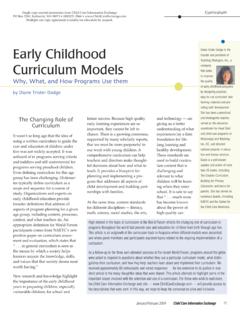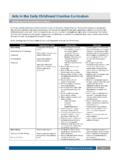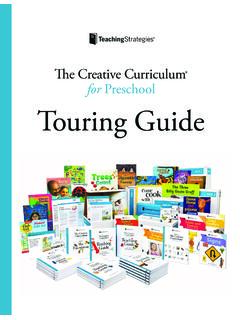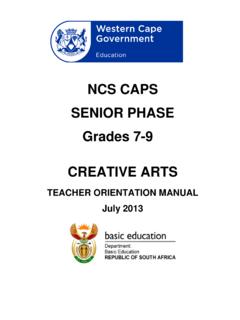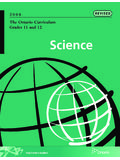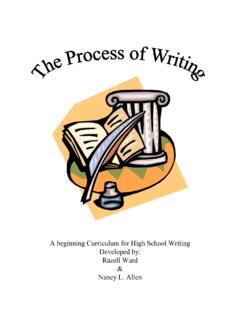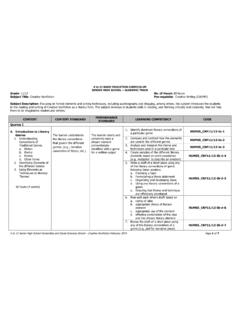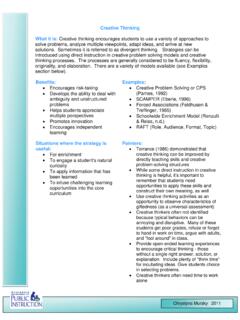Transcription of Integrating components of culture in curriculum planning
1 Available online at International Journal of curriculum and Instruction 8(1) (2016) 1 8 IJCI International Journal of curriculum and Instruction Integrating components of culture in curriculum planning Grace Chibiko Offorma a * a Department of Arts Education, University of Nigeria, Nsukka, Nigeria Abstract culture is seen from different perspectives but the focus of this paper is on the totality of people s way of life; those things that bind the society together. In this paper, the key concepts of curriculum , culture , and curriculum planning are explained. The components of culture , namely, universals of culture , specialties of culture and alternatives of culture are discussed.
2 Integration is briefly presented and how to integrate culture in the curriculum planning is discussed. This can be done through situational analysis to identify the necessary cultural contents to be included or integrated in the curriculum . Different modes of delivery to be used are role play, dramatization, collaboration, field trips, games and simulation, and other interactive modes that make learning meaningful and worthwhile. 2016 IJCI & the Authors. Published by International Journal of curriculum and Instruction (IJCI). This is an open-access article distributed under the terms and conditions of the Creative Commons Attribution license (CC BY-NC-ND) ( ).
3 Keywords: culture ; curriculum ; curriculum planning 1. Introduction culture is an important factor in curriculum planning and drives the content of every curriculum . This is because the essence of education is to transmit the cultural heritage of a society to the younger generation of the society. curriculum is a veritable tool for attaining the educational goals of a nation. Education is the hub of all ramifications of development in any country. No country can develop if her educational system is weak. curriculum planning should therefore endeavor to integrate the components of culture , which is the essence of education in curriculum planning to ensure that the products of the educational system would be functional members of their society.
4 In this paper the key concepts: curriculum , curriculum planning , and culture are explained and discussed. The components of culture are discussed and how they can be integrated in the curriculum is presented with examples or with illustrations based on * Corresponding author name. Tel.: +234-803-818-8983 E-mail address: 2 Grace Chibiko Offorma / International Journal of curriculum and Instruction 8(1) (2016) 1 8 the Universal Basic Education level. Finally some recommendations are made for improvement of curriculum development in Nigeria.
5 2. Concept of curriculum There exist different definitions of curriculum . The definitions are according to the different conceptions of education and the functions of school and types of the school products. The origin of the word curriculum was from the Latin word currus , which means to run a race. This implies that children commence to learn as soon as they enrol in a school (begins to run the race). This race is comprehensive in nature because, in the course of the race, the child or the learner encounters many experiences, which may be intellectual, social, moral, spiritual or physical.
6 These experiences are provided to produce the total man, a functional member of the society. The experiences may be formal and planned or informal and accidental or unplanned. In the course of the race, some children may also encounter some obstacles, which they must surmount either through their efforts or by the assistance of someone else to enable them to attain the expectations of the society. curriculum can be defined as the document, plan or blue print for instructional guidance which is used for teaching and learning to bring about positive and desirable learner behaviour change (Offorma, 2014).
7 This definition refers to the formal curriculum , which is planned ahead of time, bearing in mind the characteristics of the curriculum recipients, the philosophy and goals of education, (reflecting the culture of the people) the environment, the resources, methods of teaching, and evaluation procedures. It is the road map to attainment of the goals of education. The definition of curriculum as a structured series of learning experiences intended for the education of the learners is related to the above definition. It is a course of studies offered in the school for the education of the learners, and which students pursue to get a degree, a certificate, a diploma or any other forms of academic awards.
8 Learning experiences, which are culturally based are embedded in courses taught to the learners in schools. The learning experiences are learner oriented, goal oriented and culture oriented; and they can be physical or mental activities, observable or unobservable (Offorma, 2002). Learning experiences are equated to curriculum content by some authors (Tyler, 1971; Ivowi, 2009). Wheeler (1978) distinguishes learning experiences from the content. He sees the former as the activities engaged by the learners and the latter as the knowledge to which they are exposed.
9 curriculum is a programme. This includes programme of studies, programme of activities and programme of guidance. One cannot talk about curriculum without referring to the programme of studies, which is seen in form of subjects, contents, subject matters and bodies of knowledge. The programme of activities entails all the learning experiences embarked upon by the learners. Learners learn through activities and so the Grace Chibiko Offorma / International Journal of curriculum and Instruction 8(1) (2016) 1 8 3 programme of activities facilitates the learning of the programme of studies.
10 Programme of guidance is the help rendered to the young and inexperienced members of the society by more experienced persons to guide them to solve their educational, career or vocational, and socio-personal problems. All these mirror the culture of the society. curriculum can be further regarded as the instrument by means of which schools strive to translate the demands and aspirations of the society in which they function into concrete realities. It is planned and sequenced. Education is a vehicle through which curriculum objectives are attained. The essence of education is to transfer the knowledge, facts, skills, values and attitudes learnt from one situation to solving problems in another situation, and this is done through curriculum that reflects the culture of the people.










